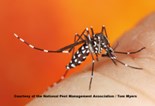Need assistance? Call 800.996.4402

The Asian tiger mosquito is an exotic species that gets its “tiger” name from the single white stripe down the center of its head and back. This biting insect can transmit harmful diseases like West Nile virus, Chikungunya and dengue fever.
Like other mosquito species, only females require a blood meal to produce eggs. Asian tiger mosquitoes typically feed during the daylight hours when they are most active. The males do not bite and primarily feed on plant nectar.
The bite from a female Asian tiger mosquito can leave an itchy, red bump on the skin. But, the real threat posed by this pest is its ability to transmit numerous diseases including West Nile virus, encephalitis and dengue fever.
The Asian tiger mosquito is also the primary vector for Chikungunya, a virus similar to dengue fever. The disease originated in southeast Africa and was first described in Tanzania in 1952. It has since spread throughout the Americas, the Caribbean islands, and most recently in the United States.
In warm regions, Asian tiger mosquitoes are active year-round. However, they are known to overwinter in temperate climates. The females lay their eggs inside items that can hold stagnant water, such as tires, flowerpots, birdbaths and clogged drains.
The most effective way to prevent contact with Asian tiger mosquitoes is to eliminate areas of standing water around the home such as baby pools, flowerpots and birdbaths. Homeowners should also screen all windows and doors. Those who spend time outdoors should wear long pants and sleeves, and use an insect repellent containing 20 percent DEET.
For the very best food safety consulting, auditing and training, please visit our strategic partner, CFS Food Safety